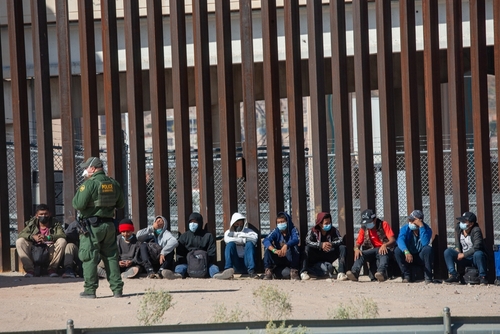Senator Mike Lee’s introduction of the America First Act aims to alter the dispersion of public benefits, sharply limiting illegal immigrants’ access and sparking a debate nationwide. Proponents view this measure as a necessary step toward safeguarding taxpayer dollars, while critics argue it could neglect necessary humanitarian considerations.
The Controversial America First Act
The America First Act focuses on restricting public benefit access to U.S. citizens and lawful residents. Key reforms include removing eligibility for welfare, housing, education, and disaster relief for illegal immigrants. Senator Lee’s bill seeks to reverse current policies under the Biden-Harris administration, which allegedly allow foreign nationals to exploit welfare benefits.
The proposed legislation also aims to exclude illegal immigrants from receiving college aid and restricts funding for education in sanctuary jurisdictions. Sen. Lee believes curbing welfare access will prevent more illegal immigration spurred by the allure of public benefits. Republicans support using budget reconciliation to pass the Act with a simple majority.
BREAKING: Senator Mike Lee introduces legislation to ban illegal immigrants from receiving public benefits.
Make it law. pic.twitter.com/OzU45pKzQU
— Ian Jaeger (@IanJaeger29) December 18, 2024
Financial Implications
The America First Act promises an impactful fiscal change by saving more than $177 billion from programs like SNAP, TANF, Medicaid, CHIP, and housing benefits. The Congressional Budget Office reported that the immigration surge is expected to add $0.3 trillion to federal spending from 2024 to 2034, underscoring the significance of addressing benefits distribution to curb this rising cost.
The Foundation for Government Accountability endorses the bill, arguing it is a step toward fiscal responsibility and fairness. Limiting benefits to citizens and lawful residents could help manage the financial burdens exacerbated by increasing immigration.
Senator Mike Lee is stirring controversy with his proposal to deny public benefits to illegal immigrants—do you think the bill will pass or is it just meant to make headlines?
— Dr. Joseph Ford Cotto (@JosephFordCotto) December 18, 2024
Humanitarian Concerns and Opposition
Opponents of the bill argue that these measures could adversely affect vulnerable groups reliant on these services for health care and basic needs. They caution that narrowing benefit access risks neglecting ethical responsibilities to treat all individuals with care and dignity.
Critics highlight that immigrants make up a significant portion of the uninsured population, complicating the issue of limited healthcare access. Measures like the HEAL Act, aimed at lifting barriers to healthcare for immigrants, contrast starkly with Lee’s proposals by advocating comprehensive care regardless of immigration status.
Sources:
- Booker, Jayapal, Barragán Introduce Bicameral Legislation to Lift Barriers to Health Care for Immigrants
- Senator Lee’s America First Act Would Deliver On Promises Made to Voters
- Mike Lee looks to halt welfare for illegals going on under Biden with key budget process | Fox News
- Mike Lee looks to halt welfare for illegals going on under Biden with key budget process

